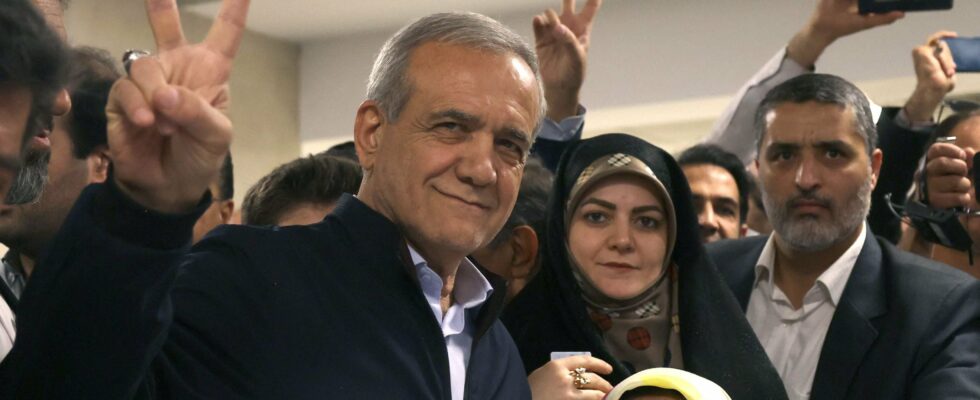Reformist candidate Massoud Pezeshkian, a 69-year-old MP who advocates for Iran to open up to the West, won the second round of the presidential election on Saturday, July 6, with more than 16 million votes out of a total of 30 million ballots already counted, according to electoral authorities. He is ahead of ultraconservative Said Jalili, who has so far received 13 million votes.
Organised in haste after the death of ultraconservative President Ebrahim Raisi in a helicopter crash in May, the presidential election was held in a context of popular discontent, particularly over the state of the economy, which has been hit by international sanctions.
After Friday’s vote, in which some 61 million Iranians were called to the polls, turnout stood at 49.8%, after a first round marked by a high abstention rate. The number of invalid ballots is estimated at more than 600,000.
“The voice of the voiceless”
“We will extend the hand of friendship to everyone, we are all people of this country, we should use everyone for the progress of the country,” Massoud Pezeshkian said in his first speech since his victory, thanking his supporters. While affirming his loyalty to the Islamic Republic, the one Iranians call “the doctor” called for “constructive relations” with Washington and European countries in order to “bring Iran out of its isolation.”
No one would have bet on this MP from Tabriz, the big city in northwestern Iran, when his candidacy was accepted by the Guardian Council along with five other candidates, all conservatives. This father, who raised three children alone after the death of his wife and another child in a car accident in 1993, presents himself as the “voice of the voiceless”.
The election was closely watched abroad as Iran, a Middle Eastern heavyweight, is at the heart of several geopolitical crises, from the war in Gaza to the nuclear issue, in which it opposes Western countries, notably the United States, its sworn enemy. Massoud Pezeshkian, who came in first in the first round, advocates for an Iran more open to the West. Said Jalili, 58, is known for his inflexible positions towards Western powers.
The new president has received support from his predecessors, the reformist Mohammad Khatami and the moderate Hassan Rouhani. Opposition figures in Iran and in the diaspora had called for a boycott of the vote, judging that the conservative and reformist camps represent two sides of the same coin.
Restricted powers
Massoud Pezeshkian called for a resolution of the issue of compulsory veiling for women, one of the causes of the large-scale protest movement that shook the country in late 2022 after the death of Mahsa Amini, who was arrested for violating the strict dress code. In two televised debates, the candidates discussed the country’s economic woes, its international relations, low voter turnout and government internet restrictions.
A nuclear negotiator between 2007 and 2013, Said Jalili had strongly opposed the agreement finally concluded in 2015 between Iran and world powers, including the United States, which imposed restrictions on Iranian nuclear activity in exchange for sanctions relief. The nuclear negotiations are currently at an impasse after the unilateral withdrawal of the United States in 2018, which reimposed severe economic sanctions on Tehran.
The election is expected to have limited repercussions, as the president has only limited powers: he is responsible for implementing, at the head of the government, the broad political guidelines set by the supreme leader, Ayatollah Ali Khamenei, who is the head of state.
